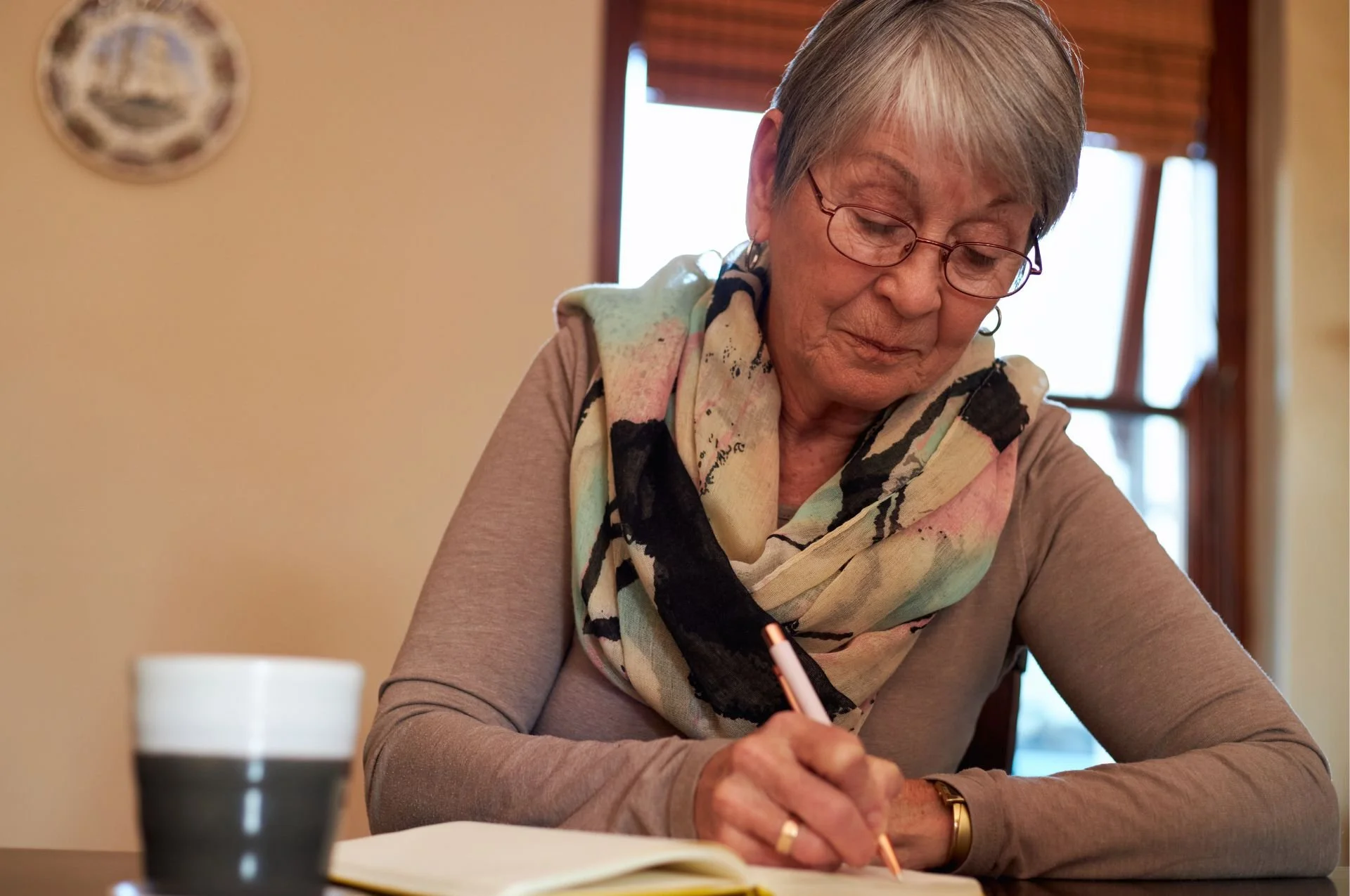Sharing Your Story: Journaling, Memory Tips, and Staying Connected
Journaling can be a powerful way to reflect, preserve experiences, and connect to others.
Every life is filled with stories worth remembering and sharing.
From childhood adventures to family milestones, these memories connect us to the past and remind us of our journey. For older adults, writing things down—or even just talking about them—can be a powerful way to reflect, preserve experiences, and stay connected to others.
At Next Nest, we believe that journaling for seniors, simple memory tips, and even mindful use of tools like Facebook can bring joy, reduce stress, and may even help keep relationships strong.
Why Your Story Matters
Everyone has a unique story. Sharing yours—whether through writing, talking, or even posting online—creates a bridge between generations. For family members, even the smallest details are treasures. A granddaughter might love hearing how you met her grandfather, while a neighbor may laugh at a story about your first car.
But beyond leaving a legacy, storytelling is healthy.
It gives structure to your memories, encourages reflection, and often sparks conversations that deepen bonds with others.
Journaling for Seniors: A Simple Way to Capture Memories
Journaling should not be intimidating. You don’t need to write pages every day or worry about grammar and spelling. Think of it as collecting little snapshots of your life.
Here are a few friendly ways to start journaling for enjoyment:
Add photos, pressed flowers, or bits of fabric to help bring your memories to life.
One line a day. Jot down one sentence about what you saw, felt, or remembered. Over time, these small notes add up.
Use memory prompts. Questions like “What made me smile today?” or “What did my hometown look like when I was a child?” make it easy to start writing.
Mix words and pictures. If you prefer, include photographs, postcards, or even simple sketches in your journal.
No rules allowed! Write when you feel like it—morning, night, or even once a week.
Journaling for seniors is about enjoyment, not homework. The act of writing itself can lift your mood, sharpen your mind, and give you something meaningful to share with others or keep for your eyes only. 😊
Memory Tips for Older Adults: Keeping Daily Life on Track
Forgetfulness happens! To everyone! No matter your age!
I keep a Month-at-a-Glance to help track my life. Norma
The key is finding little habits that make life smoother. These simple memory tips for older adults can help:
Use lists and reminders. Write down groceries, appointments, and tasks to take the pressure off your memory.
Keep a visible calendar. Whether it’s on the fridge or in your phone, check it daily to stay organized.
Editor’s Note: I LOVE calendars! And sticky notes! My current favorite is month-at-a-glance. Adds confidence and structure to my daily life.
Repeat information out loud. Saying names or facts a few times helps your brain hold onto them.
Pair habits together. Connect new tasks to familiar ones, like taking medication right after brushing your teeth.
Editor’s Note: I have three pill dispensers (the 7 days per week kind), one next to the bed before I even get up in the morning, one for after breakfast, and one for the afternoon. It’s a simple way to keep track of different meds.
These strategies aren’t just about remembering—they help create routines that bring confidence and peace of mind.
Facebook for Seniors: Staying Connected (Without Replacing Connection)
Editor’s Note: I know, it’s a hot topic! But here goes:
Many seniors find Facebook to be a helpful way to keep in touch with family and friends. You can see photos of grandchildren, join special interest groups, or reconnect with people from your past. Used thoughtfully, it can be a wonderful tool.
Pros of Facebook for seniors:
Instant updates and family photos.
A way to reconnect with old friends.
Easy to share your own photos, memories, or stories.
Cons to keep in mind:
Scrolling online can’t replace the warmth of a personal visit or phone call.
Too much screen time can feel isolating instead of connecting.
Not everything you see online is true or positive. Avoid the trolls and carefully delete “friend invitations” from people you don’t know.
TIP: Use Facebook as a supplement, not a substitute. “Liking” a photo is nice, but hearing your voice on the phone—or seeing you in person—means so much more to loved ones.
Editor’s Note: I’m working on improving the quality of my sleep, and one thing that the “sleep experts” say is to shut down all your screen time at least 30 minutes before bedtime. Highly encourage you to follow that suggestion. It has helped me!
Celebrate Life Through Storytelling
The heart of journaling, memory tips, and even using Facebook wisely is simple: it’s about celebrating life and staying connected. Your stories are valuable, your memories matter, and your presence—whether on paper, online, or in person—makes a difference.
✨ Try this today: Write down one memory from your childhood and share it with a loved one—on paper, in person, or even with a quick message online. You’ll be surprised how something so small can spark a meaningful conversation.
At Next Nest, we encourage seniors to embrace the small habits that bring joy and connection. Journaling for seniors can turn a simple memory into a keepsake. Memory tips for older adults can ease daily life. And thoughtful use of Facebook can add an extra layer of connection without replacing real relationships.




